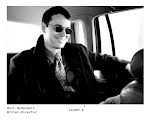V. S.
If Pnin seems to be asking its reader to uncritically enjoy
a few stretches of time spent in Pnin's company, Pale
Fire invites, almost compels interpretation. Its many
layers, its various ways of reading, its multiple narrators
all suggest complexity.
I wonder if on a much simpler level Pale Fire isn't also
Nabokov's attempt to deal with the sense of unreality his
earlier life must have come to hold for him ensconced
in the academic wilds of New England.
Of course Nabokov's father was killed by a real
assassin's bullet; but one must wonder if there were not
times when Nabokov's memories of a Tsarist-tinged
social order - from the estate at Rozhdestveno which
belonged to him for less than year to his father's death
in the futile tumult of Russian emigre politics in Berlin -
came to seem as unreal to him as Kinbote's musings on
his friendship with John Shade or as dream-like as a
deposed king's memory of ruling and
fleeing an imaginary kingdom called Zembla.
V. N.
Tuesday, November 30, 2010
Pale Fire: V. Sirin's Dream Life
Labels:
Berlin,
Charles Kinbote,
John Shade,
Pale Fire,
Pnin,
Vladimir Nabokov,
Zembla
Subscribe to:
Post Comments (Atom)

No comments:
Post a Comment